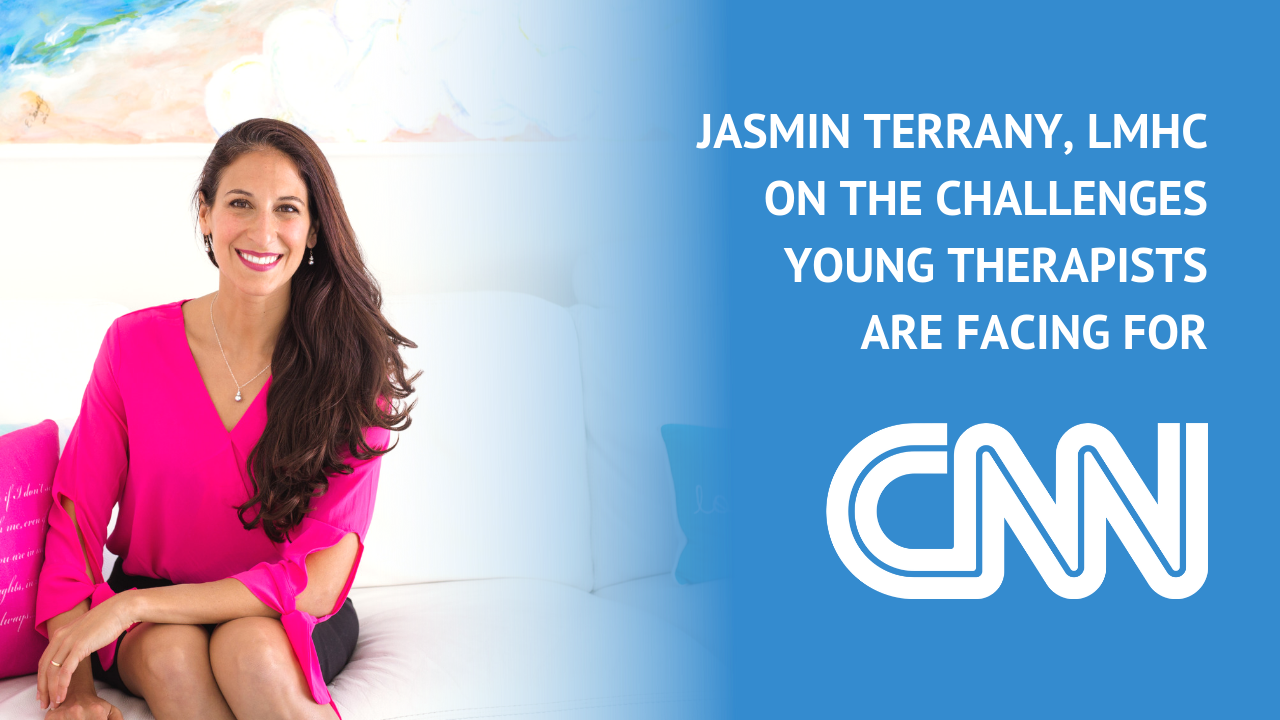
In a recent article on CNN, New York and Miami psychotherapist Jasmin Terrany, LMHC discusses the challenges young mental health professionals are facing when they start practicing, including finding an office space, determining the best tools for running a business, finding clients, dealing with burnout, and similar issues.
“You’ve done all this training and you have all these skills, but getting clients is a whole other animal. You didn’t go and get your Master’s in business,” states Jasmin.
Jasmin explains that even though she’s had her own private practice for more than a decade, anything that “can make mental health professionals feel less alone and supported would be a good thing.” She strongly believes that burnout is real and that therapists need as much assistance as the clients themselves.
The CNN article examines the tech industry’s efforts to address the growing mental health concerns in the United States by building solutions that simplify the process for both clients and mental health professionals including psychiatrists, psychologists and social workers. In that context, the story covers Alma, a mental health startup that aims to create a more contemporary and more comfortable therapy experience for both therapists and clients. The startup, launched in October 2018, is a brick and mortar space where local mental health professionals can go through a membership application process and, upon acceptance, use the space to treat clients, and network with colleagues in the field. The therapists pay a monthly rate plus an hourly rate for booking private rooms, while Alma provides support in the business side of practicing, such as billing, scheduling, video session software, and more.
Jasmin Terrany, LMHC is not affiliated with Alma, and has a virtual private practice since 2007. Jasmin holds two Master’s Degrees from Columbia University and is the inventor of Life Therapy™, a combination of Psychotherapy & Coaching + Mindfulness & Meditation. She helps professional women and mothers find success in their personal lives. Whether struggling with relationships, anxiety, confidence, body image, or parenting, Jasmin has practical tools to create extraordinary lives. Her book, “Extraordinary Mommy”, was inspired when her daughter was born on the first anniversary of her mother’s death. Through heartfelt stories, and cliff-notes style she summarizes the ten practices that matter most for any mother.
Author: J4sMin7err4ny
How to get your kids to do their daily tasks?
Recently, I was talking to a few parents about this prospect of how do we get our kids to do the things that they’re supposed to do.
How do you get them to brush their teeth, or put on their pajamas, or whatever their daily tasks are?
One parent said that every time they get annoyed, they start taking away their kids’ things, giving them consequences and discipline. Another parent said that they try to bribe them and give them treats every time they do the right thing.
I think that those are two extremes and there’s a middle ground. We don’t want our kids doing things because they’re scared of the consequences, and we don’t want them doing the right thing because they’re being bribed. We want them to do the right thing because they want to, and because they care about themselves and their lives. So the idea is to give them things that they want to earn. By being good, doing the right thing, they will eventually get to earn their TV time, or their toy, or whatever. But they’re earning it, we’re not bribing them for it.
The #1 Killer of Marriages
The #1 killer of relationships is having unrealistic expectations.
You think it’s supposed to be easier than it actually is. It started out one way and now it’s different.
It’s important to realize that relationships start off as passionate love. That’s what gives you the attraction. But, eventually, when you look at those old people holding hands while they’re walking down the road, it turns into compassionate love. And that’s different. That’s your best friend, your partner.
When you expect the relationship to be amazing, you’re setting yourself up for disappointment, because relationships evolve over time. Being able to embrace the beauty in the compassionate love, and the beauty in the peace, the ease of it, is better than trying to hold on to something that’s already gone.
When to Speak Up
Should we always say something and speak up when something is annoying to us?
A rule of thumb is to think of this as a spiritual practice. Whether it’s your relationship with your partner or with your loved ones, your feelings are your responsibility.
Different people in our lives in different situations that happen are triggers for our feelings to arise. But we can’t blame those people and use statements such as: “you made me feel this way.” It’s not helpful, because it’s giving them the power, and it’s letting them be in charge of how we feel. These people may be triggers, but the feelings are still ours.
So, when in doubt, if you want to say something, instead of placing blame, share your feelings with these kind of statements: “I’d like you to understand what it is that I’m going through, what it is that I’m dealing with, and how I’m trying to handle it within myself,” instead of these kind of statements: “You need to do something differently so that I don’t feel this way.”












